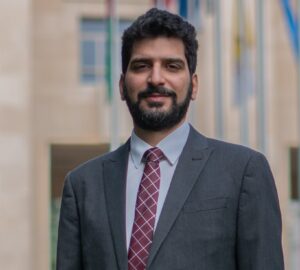July 9, 2024
Fruitfulness, faithfulness and vision characterize the persecuted church in many parts of the globe, an advocate for international religious freedom told a Houston-area Baptist church.
Wissam al-Saliby, president of the 21Wilberforce human rights organization, spoke at The Woodlands First Baptist Church the Sunday before Independence Day.
Al-saliby sought to dispel some misconceptions about persecuted believers globally.

Wissam al-Saliby, former advocacy officer and director of the Geneva Office of the World Evangelical Alliance, is the new president of 21Wilberforce. (Photo courtesy of 21Wilberforce)
“More often than not, the persecuted church is persecuted because it is flourishing,” he said.
In many cases around the world, Christians are persecuted because God has blessed their ministry, and it is “bearing fruit,” he noted.
Furthermore, persecuted believers often make the deliberate decision to stand against forces that discriminate against religious minorities.
“The persecuted are not helpless victims,” al-Saliby said. “They have agency.”
Often, persecuted believers make the conscious and prayerful choice to “push back” against restrictions on the free exercise of faith, he said.
“God is calling them to speak truth and justice against injustice,” he said.
Al-saliby recounted a conversation with the pastor of the Baghdad Baptist Church, who described how he is “building bridges” by systematically visiting leaders of other religious communities in Iraq.
“I am so grateful to hear this—that they are answering God’s calling to be peacemakers despite the persecution,” he said.
Al-saliby described the extreme danger some religious minorities globally face because they practice their faith.
“In Pakistan, India and Nigeria, there are attacks by mobs and armed groups claiming lives every year,” he said.
However, he noted, believers in those nations are peacefully resisting through legal channels. In India, for example, Christian leaders have appealed to the nation’s Supreme Court, detailing instances of violence against religious minorities and calling on the court to act.
“So in these countries, the persecuted Christians and the leaders of the Christians are imitating the Apostle Paul, saying, ‘We are taking our case to Caesar,’” al-Saliby said.
Coming alongside the persecuted church
Christians in the United States and other advocates for religious freedom have a role to play in supporting persecuted believers, he emphasized.
“As the church journeys to Caesar’s palace like Paul did, 21Wilberforce comes alongside the churches and the Christian leaders,” al-Saliby said. “We listen to them, understand their priorities, and understand how we can partner, serve and equip them.”
He encouraged Christians in the United States to pattern their behavior after the Philippian Christians who supported and encouraged Paul when he was in prison.
“How can we steward the wealth, the influence and the freedom we have been blessed with for the sake of those suffering persecution and imprisonment and [who are] threatened by violence?” he asked.
He challenged Christians in the United States and elsewhere to “partner with the persecuted” through prayer and financial support, by equipping and training leaders, and by “leveraging grassroots political influence.”
Al-saliby called on the church in the West to pray for the perseverance of persecuted believers.
He also encouraged American Christians to pray for God to “visit the persecutors” and change their hearts, just as the Lord appeared to Saul of Tarsus on the road to Damascus and transformed him into the Apostle Paul.
“This is the ultimate victory against persecution,” he said.
Reprinted from Baptiststandard.com
Featured image caption: Wissam al-Saliby, president of the 21Wilberforce human rights organization, spoke at The Woodlands First Baptist Church the Sunday before Independence Day. (Screen capture image from YouTube)

